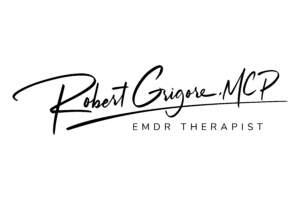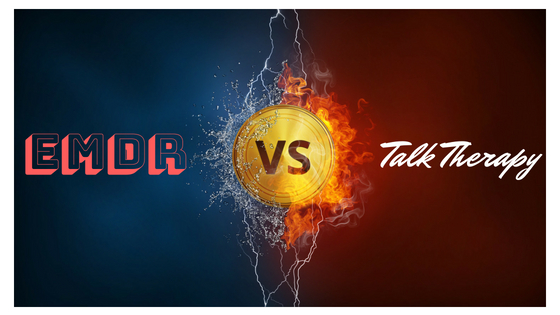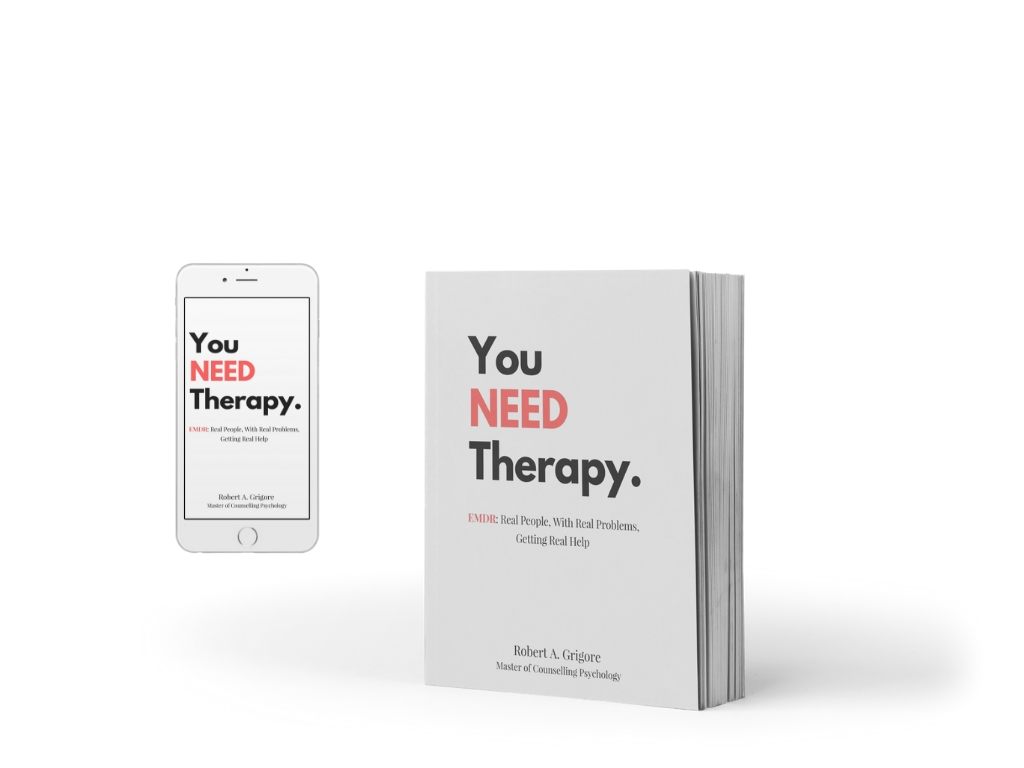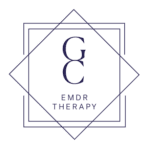EMDR vs. Talk Therapy (generally CBT). This is a great current debate, and one that I’ve recently highlighted in my brand new book: You NEED Therapy. EMDR: Real People, With Real Problems, Getting Real Help. If you’ve read my short little book (less than 100 pages), you’ll notice that I clearly outline the need for all of us to seek therapeutic help, as so many of us are affected by mental health distress (about one in five according to the Centre for Addiction and Mental Health).
Moreover, I personally believe that the number is much higher: 100% of us are affected by mental health distress, because 100% of us have experienced (and survived) trauma. I go into more detail in my book about the different kinds of trauma, suffice to say not all trauma is of the “obvious” variety. I also clearly identify how Eye Movement Desensitization and Reprocessing (EMDR) is in my opinion the best, and fastest way to not just manage or cope with symptoms, but to completely eliminate them.
So I get this question often: “So Robert, if EMDR therapy is in your opinion the best and fastest form of therapy out there, why should I bother going to a talk therapist?”
Good question. In this blog post, I’m going to outline a few benefits and limitations of both therapies, and at the end, maybe it will become clear as to whether the two forms of therapy can work together, or if they are destined to be enemies!
Let’s start with EMDR.
Eye Movement Desensitization & Reprocessing

Eye Movement Desensitization and Reprocessing was first conceived in 1987 by Dr. Francine Shapiro. It was an accidental discovery while she was walking in a park, and discovered that her distressing thoughts were becoming less distressing as she moved her eyes back and forth (probably watching birds, people, trees, etc.). Skipping over a great deal of the history here, EMDR was first used to treat Post Traumatic Stress Disorder (PTSD), and it was very successful. Since then, EMDR has been adapted to treat almost any kind of distress and or mental health disorder.
One of the hallmarks of EMDR is that it works significantly faster than talk therapy. Prior to my learning how to conduct EMDR, I was a talk therapist. I had been working with a full caseload of clients with variations of significant trauma and PTSD symptoms (as a result of experiences such as rape, torture, physical violence, emotional blackmail, psychological manipulation – you name it). During that time, I had been working with these individuals for over two years, and only seen improvements in moderation – they began to stop self-harming, felt safe (enough) to share their stories, maintained a strong therapeutic alliance with me, and so forth. But the main issues that they were really struggling with (like being triggered in personal or social situations, aversion to intimacy, suffering from nightmares or flashbacks, difficulty with feelings of worthlessness, low self-esteem, reacting to feelings of shame with alcohol or drug use, etc.), were still there…lingering beneath the surface. Many of my trauma survivors would often say to me, “If only you knew the ‘real me’.”…
Once I started treating these very same individuals with EMDR, I began to see changes that I had only ever dreamed about (and for which my clients were too afraid to dream of). We were wrapping up treatment in as little as 8-12 sessions.
Prior to treating these individuals with EMDR, could I call myself a “Master Talk-Therapy Clinician”? No. Of course not; but since I had just begun to use EMDR at the time, I couldn’t call myself a “Master EMDR Clinician” either. It would seem that in using EMDR, I was helping more people, on a deeper level, in a fraction of the amount of time, with a psychotherapy approach that I had just discovered – as opposed to an approach that I had been studying for the better part of a decade (existentially-informed talk therapy).
A study by Gauhar (2016) showed that EMDR yielded a 95% effectiveness rate for treating depression, compared to a 40-50% effectiveness rate for treating depression that combined Cognitive Behavioural Therapy with medication (the most common method of treatment for depression to date). Furthermore, Gauhar showed that it only took six to eight sessions of EMDR to show noticeable improvement.
Another hallmark of EMDR is that after successfully completing treatment, the symptoms do not return. That means that you go for treatment once for each issue and when you’re done, you’re done. By “once” I mean however long it takes for the issue to be cleared the first time (could be two sessions, could be six, or 12, etc.), afterwards, that particular issue is eliminated for you. That’s not to say you’ll never have distress again (‘life happens”), but at least you will not have to struggle with the same issue again and again.
A U.S. National Comorbidity Survey published their findings that the “depression relapse rate” for those treated with CBT was between 50% and 80%, compared to the “depression relapse rate” for those treated with EMDR as being 0% (Gauhar, 2014)!
Very similar findings exist for other clinical issues such as PTSD, phobias, addictions, etc. In my book, You NEED Therapy: Real People, With Real Problems, Getting Real Help, I provide a nice list of some of these examples! Suffice to say, there’s no shortage of them after EMDR has been researched for over 30 years.
EMDR is endorsed by many professional associations throughout the world, such as: American Psychological Association; World Health Organization; U.S. Department of Veteran Affairs and Department of Defense; U.S. Department of Health and Human Safety; Dutch National Steering Committee; National Institute for Clinical Excellence; and more. Moreover, EMDR is often provided to survivors of natural disasters, mass trauma incidents, and terrorist attacks – sometimes immediately following the incident in order to help process the recent trauma event. Suffice to say, EMDR is highly regarded for its clinical effectiveness.
Another difference between EMDR and talk-therapy is that there is NO homework with EMDR. You will be taught coping strategies in the beginning to ensure that you have the appropriate techniques to handle any triggers or reminders of trauma that might occur between sessions, but you will not be required to do things like: write lists at home, perform actions or statements in public to “improve confidence,” do something that makes you feel uncomfortable to “get over” your fears, read books and practice their exercises, etc. All you need to do is come to your scheduled session, report on what your experiences are in session (and anything that seems important between sessions), and trust that the Certified EMDR Therapist knows how to take you from where you were at the start of treatment, to where you wish to be at the end of treatment.
Need I say more? Let’s move on to Talk Therapy, shall we?
Talk Therapy
Before I adopted the sole focus of EMDR therapy in my practice, I was a talk therapist. Specifically, I was most intrigued and drawn to Existential Therapy (which is a form of Cognitive Therapy). For the purpose of this blog debate, I’m going to refer to “Talk Therapy” as “Existential Therapy,” “Cognitive Behavioural Therapy,” and “Psychoanalysis” (I’ll be sure to reference which form of therapy I’m referring to.)

First, a little history about Talk Therapy. Beginning of course with Psychoanalysis, everyone is familiar with Sigmund Freud (referred to as “The Father of Psychoanalysis”), who was mainly responsible for bringing the concept of “Talk Therapy” to bear as he called it, “The Talking Cure.” In its original form, Psychoanalysis consisted of the patient lying on a couch with the psychoanalyst sitting on a chair behind the patient’s head. The patient would continuously speak of whatever came into their unconscious mind (called Free Association), and the psychoanalyst would write everything down. The concept was that as the patient freely associated, their unconscious and unresolved issues (usually early childhood years) would become transferred onto the therapist (called “transference”), and the patient would transform their therapist into an important figure (usually a parental figure). The psychoanalyst would then analyze the transference and respond verbally with statements to hopefully elicit change in the individual.
Cognitive Behavioural Therapy (CBT) has often been referred to as beginning with the Ancient Greek philosophy, Stoicism. These philosophers believed that through the use of logic, they could assist individuals with discarding certain belief systems and behaviours. If you’re interested in learning more of CBT’s early beginnings, I’m sure if you Google, “History of Cognitive Behavioural Therapy,” you’ll be sure to find some fascinating reading there…but I’m going to skip over significant amounts of history, in the interest of keeping this blog post fairly concise.

The basic idea behind CBT is that for every given moment, individuals act based upon a pattern of influence from their thoughts, feelings, and behaviours. Behaviour could drive a particular feeling, which would spark a thought; a thought could elicit a behaviour, which influences a feeling; a feeling may ignite a behaviour, and consequently thoughts afterwards; and so on. If one could identify the chain reaction of a particular problem in their life, this identification could give someone more control over the same situation again, should it arise in the future.
Take the following example: Imagine that I am struggling with the thought that “I am stupid.” I find myself feeling extremely afraid and ashamed of that thought. Then I follow that up with “…But I have a Master’s degree!!” I then end up depressed and don’t leave my house for weeks, except to get groceries, and go to and from work. CBT would examine the thoughts, feelings, and behaviours, and see how they all intersect. It would make sense that they each influence each other: I end up staying home to avoid having to “prove” my intelligence to others, saving myself from the feelings of shame should I “not measure up” to the expectations of others, which protects me from thinking “I’m stupid.” By identifying the belief of “I’m stupid,” and finding evidence that refutes that belief (such as having a Master’s degree), such action may influence my feelings of shame to reside and subsequently, allowing me the courage to “risk” social interaction again.
Here are some benefits
- Talk therapy provides a very open and exploratory avenue for clients to develop their awareness of their skills (or lack of skills). The therapist will gently encourage their client to lead themselves into their unknown, so that they can begin to build their awareness.
- The client generally does the majority of the talking in talk therapy, with the therapist asking a few poignant questions to help move the client along.
- When I worked as an Existential Therapist, I focused heavily upon challenging my client to build their awareness of their responsibility to choose how to respond to a particular challenge. While I did not offer solutions, my client often begun to recognize their options.
- Existential Therapy is a therapeutic focus which asks the “big questions” about life: If we are all free to make our own choices, what choices are you making right now? If your life is up to you to create meaning from, how are you taking an active role in that pursuit right now? Since nobody else can see through your eyes and see exactly what you see, you (and everyone else) how do you reconcile that deep loneliness?
Verdict

So what’s the verdict? Can EMDR and Talk Therapy co-exist? Are they compatible? Is one better than the other?

In my opinion, EMDR and Talk Therapy can co-exist. While I do not believe that any form of Talk Therapy has the ability to eliminate a client’s source of suffering, I do think that Talk Therapy has a role to be played. One of these potential roles could be in preparing oneself for trauma processing. An EMDRIA Certified EMDR Therapist will always make sure that a client is ready to undergo trauma processing prior to engaging in that phase of treatment (clients at Grigore Counselling & Associates are never “tossed in the deep-end” without “knowing if you can swim”), thus talk therapy is useful to assess readiness, self-awareness, and emotional tolerance.
Another area where Talk Therapy is certainly useful is in therapeutic contexts which are not prototypical environments for EMDR, such as: couple’s counselling, divorce mediation, group work, career assessment, personality assessment, and for developing self-awareness. Those with minimal self-awareness experience tend to require longer EMDR treatment, and less processing occurs at the beginning due to preparing the client’s readiness. Since Talk Therapy is usually less expensive per hour, Talk Therapy can help prepare a client to be ready to finally eliminate the actual source of their suffering once and for all.
Personally speaking, I would much rather eliminate the source of my suffering, rather than spend too long on developing coping skills and practicing their uses, which ultimately requires a lot more money to be spent on the overall cost of treatment. However, I can definitely attest to the fact that it’s nice to have someone to just talk to from time to time – especially if social engagement is something that is lacking. Although a talking relationship is useful at times, the true change comes when the underlying memories which are causing the stress is eliminated.
EMDR is the main form of treatment that is provided at Grigore Counselling & Associates. We want to get you the maximum amount of healing in the shortest amount of time, so that you can go out and live your life the way you really want to.
Have any questions? Want to provide feedback? Ready for a free consultation? Please comment below, or send us an email! We’re happy to hear from you 🙂 And please feel free to share this post with anyone who might benefit!
With care and respect,
